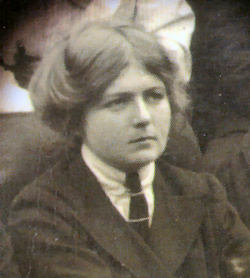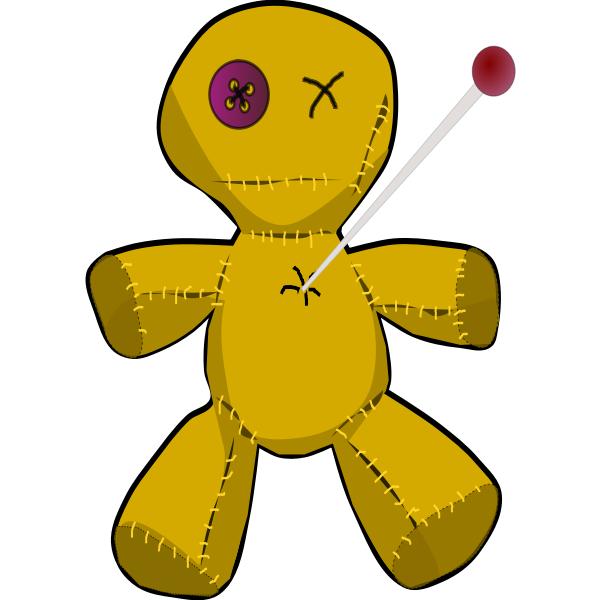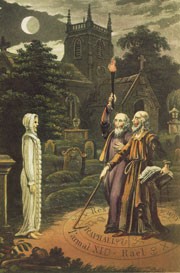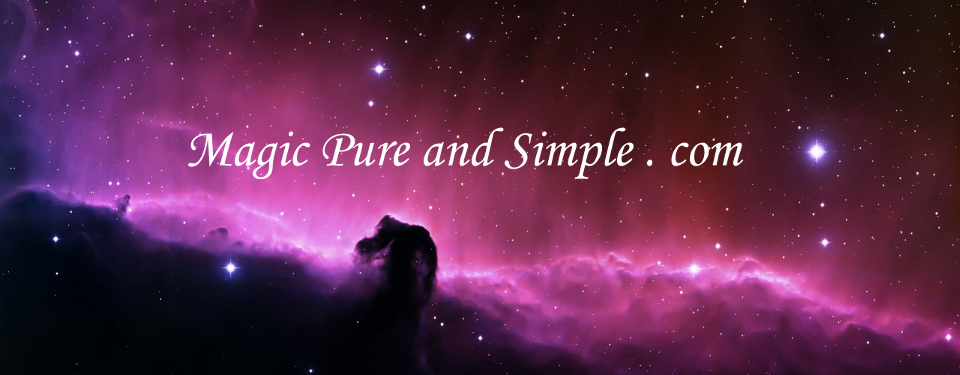This is a great question. By which, I mean that I do not know the answer. I hope to explore it and give my view and the possible opinion of a view other people who had significant influences on the coming of our Modern Magic that we practice today. I am going to need to make references to Aleister Crowley since he is pretty much the sourcework of magic. At a time when modern magic was forming, he seemed to think himself capable of engaging in philosophy, so not only was he one of the few leaders of the occult to have a huge influence on modern neopagan and occult practice, but he also questions how and why magic works creating substantial philosophical materials where many other author of the time, left us with simply ritual scripts. (You might not like Crowey, but he’s the soursework and here’s why with a few of his true failings not just the junk people say.) That said, the true writer to comment on this subject was actually Dion Fortune. She was one of the early authors of modern magic and her writing and novels had a huge influence on modern witchcraft. She was mostly influenced by theosophy and visions she was able to conjure with great ease. As a key female voice writing in the 1920s her works had a perspective that had been missing in magic since the writing of Mary the Jewess, Cleopatra the alchemist and Hypatia 1500 years without a female voice is a long time of silence and sadly we can only imagine what female voices of this time would have said.
What is Magic?
Before I can explore this in any depth I should really define the question. I don’t want to spend ages defining what I mean by Magic. So I will repeat what Crowley said:
“Magick is the Science and Art of causing change to occur in conformity with Will”
Magick In Theory and Practice – Aleister Crowley
There is something missing in this statement. Like willfully cooking dinner and turning ingredients into bolognese does not seem all that magical to many people and only really uses objective rules of physics although whether it tastes good might be subject to people’s opinions and palates. I could start defining magic by it’s what we, the practitioners of magic, do. As soon as I try there will be 101 people saying “hey you missed out me, and the way I do it! How I do it, is valid too!” So I will simply say that I feel like magic is what Crowley said, but the term implies a level of undiscovered science involved or the aforementioned change to be caused by the use of invisible connections. Also sometimes the magic is done by precise adherence to formula/instructions with minimal variation and sometimes it is self-expression, so magic is sometimes a science and sometimes an art, but rarely both at the same time. It is a science OR art. So we are left to conclude that:
Magic is the Science or Art of causing change to occur in conformity with Will, using the means of extra-scientific connections.
What are the subjective and objective?
When we practice magic, we have two worlds we participate in: the outer objective world and the inner subjective world. The outer objective world operates according to various rules, such as gravity. No matter how much a person believes that gravity is not real, if he were to exit an aeroplane far from the ground, he would soon find himself in need of a parachute. Gravity objectively exists. It is an observed phenomenon in collective consensus reality. If the person experiencing gravity did not exist, it seems gravity would still exist. It is not subject to our experience of it. The objective is something, which has qualities and virtues which are not dependent on an experiencer and are consistent from one experiencer’s experience to another.
The subjective however is dependent on an experiencer and sometimes influenced by said person. For example, if a gentleman wanted to court an enby (or non-binary individual) and did so by offering to buy them a drink. Then the target’s experience of their courting is entirely subject to their own beliefs and feelings. It might come across as creepy or misogynistic. Alternatively, it could be experienced as chivalrous, kind or any number of experiences based on how the enby views being offered a drink and how they had viewed the gentleman in the first place. Their experience is very subjective. It is affected by their own views. Often a person who is both positive and optimistic experiences a negative event. They ignore it and quickly forget it, so in their subjective experience, it is almost as if it did not happen at all. Their active memory of the negative event is subjective to their worldview. The event however still happened, even if it does not play an active role in their memory. If they try to do so, they can recall it, others recall it and any changes that occurred during said event usually remain changed even if they do not think of, or recall, the event. For example, if a women, with a negative outlook, received a bonus as much as she struggles to recall the event at a time when she is down, the money would still be in her bank account until spent, it would also still be on her payslip and in her tax records.
Is there an objective reality at all?
Some have taken to considering the possibility that there is no objective reality at all. This idea is explored in Plato’s Epistemology. To people who insist that the world is entirely subjective, I say that I will drive a knife into them and they can subjectively experience whatever they like, but I should not be arrested because their experience of being stabbed is subjective, while I chose to subjectively experience myself lecturing and making the world a smarter, more consistent and useful place. There is a degree of difficulty in denying certain aspects of reality. For example the aforementioned gravity. If it were not for some kind of objectivism, we could not have commerce. “hey I paid you already, give me my goat!”, “Well, I didn’t experience you paying me.” So it seems objectivism does exist and in most examples it is hard to deny.
The bigger question is, “would we have language at all if it weren’t for an objective existence shared among human beings?” What would it look like if we tried to develop language in a world that is entirely subjective? “It is a goat?” “No, not today, today it is rain.” “But it seems the same as when you said it was a goat.” The two are having different experiences and cannot create language without something in common to talk about. We could not learn language if it weren’t for something repeatedly common about which to speak.
Our experience of the objective world is definitely subjective, we see it through the gauze of our own memories and prejudices, but there are some things that we agree are consistent among experiences. To this point, we agree that there must be some form of commonality, which most minds share even if they do not experience it directly. That is what we call objective reality. I ask you if magic were to only change the subjective reality, then would it be any different from willful self-delusion? Is that what you want to study? Magic isn’t what we want it to be, but given the possibility that magic could be either willful self-delusion or the ability to cause changes in objective reality, I would rather not miss out on the opportunity to study the latter by entirely focusing on the former. Also, my personal experiences suggest that magic can subtly alter objective reality when done correctly.
Magic affects the subjective
One question that frequently floats around Occult circles comes from a Buddhist koan. It goes like this: “If a tree falling in the forest has no-one to hear it, does it make a sound?” This is a question of whether our consensus reality is subject to our experience of it. In quantum mechanics, something unknown is often mathematically modelled as if the unknown is currently in all possible states until it’s in a known state, then the model changes. Remember the example of Schrodinger’s cat who is hidden in a box with something that could kill it. It is said that the cat is both dead and alive until the state of the cat is inspected, this is called superposition. This is entirely for the sake of the mathematical model. There was an issue of different overlapping methods of modelling the state, but it must be remembered that the models are the map and not the territory. The cat is either dead or alive, but is modelled as both for the sake of calculation. See Nils Bohr and Albert Einsteins discussion of the observer effect for more information. Some people take the model with both states as evidence that the scientific community has established that the world is not as set as we believe it to be. They get very excited as it seems to indicate the world is more fluid than previously thought, so it would seem to confirm the possibility of things like magic which could alter it. However, it does not really indicate anything of the sort. True magic should be able to change a world that is set and in reality, the world is not so fluid, we simply lack the models to represent the world mathematically without accounting for both possibilities at once.

Some people approach magic as a form of self-delusion. They treat whatever they visualise as if it were entirely true. They can do this when it only seemed to occur within their head and imagination. This means they can go through a depressing life where they achieve nothing and imagine in their heads that they are a great sorcerer, which could bring some comfort. Then they could imagine that they had died and entered the underworld. This might allow them to put things in their life in perspective. If they then imagined they had returned from the underworld they might continue to engage with life with new more refined priorities. Then let’s say they imagined an encounter with their Holy Guardian Angel, which might give them a sense of purpose. Next, they could imagine they became a Babe of the Abyss with no identity, which might allow them to relieve themselves of attachment and ego, imagining most of the ego had been destroyed. This new self-image could relieve them of suffering and ego-centric behaviour. While there is no actual change to the physical world the change in their head allows them to have a significant change in their lives entirely through self-delusion. Every aspect of this process was entirely subject to their experience and mind. This is very consistent with the definition of Magic put forward by Dion Fortune.
Magic is the art of changing consciousness at will.
Dion Fortune
So magic can be entirely subjective. Both its practice and its effects can be subjective. They still have effected a change of the initiate which might impact how that initiate experiences the objective world around them and how they experience the higher subjective aspects of their mind. This in reality is more a form of mysticism than magick, but the line between the two is blurred so by Dion Fortune’s definition, which is very influenced by Theosophy, this is also magic.
Magic also connects us to objective spiritual reality
The question is, “is the divine also subjective?” Pagans often deify forces of nature and aspects of their world for example Gaia is the earth, Thalassa is the sea and Ouranos is the sky. The words mean both the aspect of nature and the divine representation of that. The representation is subject to the culture for example if we were to go to Egypt the names would be Geb, Wadj-wer and Nut respectively and they would be represented differently. For example, the Egyptian god and goddess of sky and earth have the opposite genders to that of the Greeks. This would imply that they are subjective. However, when presented with another culture, they note the similarity between the two deities as they exist in the physical world and say for example, “Nut is the sky, the sky is Ouranos and therefore, Nut is Ouranos”. This means there is a part of the divine aspects of nature that is objective and that part was recognised at least to a degree in pagan societies. Even for pagans, there is a source of creation. Since the divine for them is nature, the source is the meta-divine (or the beyond-divine and beyond nature). While the symbols to represent this are different from culture to culture, it is likely this too has some aspect which is considered similar between cultures. This is why there is so much similarity between practices of magic which are aimed at the meta-divine.

In the writing of Nahum Sarna in Exploring Exodus, he suggests that the cult of El Alion (the high god) which later became Judaism, deified the Meta-divine. Where pagans worship the forces of nature this cult aimed their worship at what was once considered the meta-divine. This cult later under the guise of Christianity, had no need to consider subjective views of the divine. By the time of the early modern Occult orders in the 1890s it becomes clear that in their spiritual work the initiates seemed to have an inner subjective experience of what was considered by them to be an objective deity.
“We take spiritual initiation when we become conscious of the Divine within us, and thereby contact the Divine without us.”
Dion Fortune
When Dion Fortune talks about the “divine within us”, she talks about both the drop of the divine that is considered by these orders to be in the human soul and also the human experience of deity. She then speaks of the “divine without us” to indicate a deity that exists without being subject to human experience. Perhaps a deity that hears all trees that fall in forests whether or not there are people around. Even in this more mystical definition of magic, even though it is more focused on the subjective, the attempt is to achieve subjective experiences of an objective divinity / divine court.
Lon Milo Duquette often says “it’s all in your head, you just have no idea how big your head is”. His implication is that your head also encompasses much of the world that appears to be shared with others and so what occurs within your head can have an effect on that world. In Lon Milo Duquette’s view as expressed in Low Magick is there all of reality is consciousness and so it is all subjective, it’s just a question of to whom it is subjective. This view might be similar to the view expressed in the Corpus Hermeticum, which suggests that there is a mind that surrounds the spheres including the earth so all of reality is in some form of mind and therefore consciousness. Let’s jump once again to today’s favourite quotable author.
“To say that a thing is imaginary is not to dispose of it in the realm of the mind, for the imagination, or the image-making faculty, is a very important part of our mental functioning. An image formed by the imagination is a reality from the point of view of psychology; it is quite true that it has no physical existence, but are we going to limit reality to that which is material? We shall be far out of our reckoning if we do for mental images are potent things, and although they do not exist on the physical plane they influence it far more than people expect.”
Dion Fortune

So it is clear that from the view of authors in these formative years of the modern occult practices that there was a belief that objects in the imagination existed somewhere just not physically and that existence was just as valid as something within consensus objective reality. Remember that it is only relatively objective, if you accept the postulation that the consensus reality is within the mind of some creator being as suggested in the Poemandres chapter of the Corpus Hermeticum, then you must recognise that everything in consensus reality is subject to that creator mind’s views. But this is shared from person to person, so to us, it seems objective.
Magic affects the objective world
What about a very different kind of magic which is more focused on the objective world? Folk magic often works by doing something in the objective world, like sticking pins in a poppet (or effigy of someone), and that is supposed to have an effect on the person it represents, who is in objective reality. This is called sympathetic magic. The idea is that the objective world responds to changes in other parts of the objective world. The question is does this occur without the subjective world at all? There are many variations of how sympathetic magic works. Sometimes totally different actions can have a similar result. Sometimes the same action can have totally different results, depending on the context. The question is whether the sympathetic magic that is attempted is done for the view of some divine creature, who then allots fates according to the action it witnessed or whether it is done for the subjective experience of the magician. For example, I saw myself stick pins in this doll that looks like my boss and now I experience that I am probably doing magic and my subjective experience then affects the objective world by causing my boss to have a headache and preventing him from being able to make my life a misery today. So it could be considered that to do sympathetic magic you take an objective action, which has a subjective effect on you which then effects the objective world in a magical way.

The Picatrix or the Gayat el-Hakim describe astrological magic where it is believed that an image created by the magician can be raised up to an astrological plane such as the sphere of mercury and then rain down with the effects of astrology. So the creation of the images occurs in the objective plane and it is hard to imagine that it is the position of the lines that causes the magic. It is more likely the image has a subjective effect on some minds, whether that of the magician or the deity dreaming the universe whose mind is relatively objective to us. Either way, we still have a subjective effect which causes the objective result.
Assuming that all these things we mentioned so far, all work in mostly the same way, then the only model that can explain them all is that magic occurs by creating a subjective effect with the intent to cause a change in objective reality or to affect a target’s subjective experience. But they might work differently to each other and a single model might not be suitable to cover all types of magic.
Are demons subjective or objective
Finally, we should also consider the process of summoning spirits. The question that pops to mind is whether what we summon is an aspect of ourselves and therefore subjective or whether its main existence is outside of us and objective. The first thing we should consider is not everyone sees the same demon in the same way and they don’t generally show up on camera, so it seems reasonable to assume that these demons which are summoned, do not have a physical body in objective reality and our experience of the conjured entity is subjective. Our experience of them seems to be subjective, but we often hope that they have an impact on the physical world which is objective. In order to summon spirits most magicians will stick closely to the instructions of a grimoire like a formula. This could be because the instructions objectively work or that the magician is unsure what subjective experience is intended to be achieved by the instructions. So it’s entirely possible that once again there is a subjective experience, intended to give rise to an objective present of a spirit, of which we will have a subjective experience and through that experience we hope to arrange for an objective result.

In some instances, it is worth considering the view that many magicians accepted that spirits which we summon are simply states of mind and aspects of our own psychology, which can still affect the world. This would mean once again we are creating a subjective experiences for the purpose of an objective result. It is also worth noting that an individual can create a thought-form which could be entirely constructed by the magician’s will and it would not have had an independent existence prior to the creation event. This being so it is not a stretch to assume that spirits summoned could be creations of the magician’s mind.
Now there is not a huge amount of evidence for the objective existence of spirits, but it is my view that if there were objective spirits, I would not want to create a thought-form or summon my own psychology. Therefore despite accepting that spirits might be psychological states of mind or thought-forms, I will always attempt to summon the genuine article rather than my own fabrication. Aleister Crowley once assumed that these creatures were entirely psychological in nature and it is through his work that such a view is made very popular. However, when we turn to one of his last works, Magick Without Tears, we read the following when he writes about the Holy Guardian Angel:
“He [the HGA] is not, let me say with emphasis, a mere abstraction of yourself; and that is why I have insisted rather heavily that the term ‘Higher Self’ implies a damnable heresy and a dangerous delusion. … Remember they [HGAs] are objective not subjective or I should not waste good magic on them. Let me say in particular, in regards to gods, that the god of Jupiter whom you spoke whom you invoke is not necessarily the same who I invoke. It is clear in any case that the revelation of himself to you is modified in many ways by your own particular sensitiveness; just as in ordinary life.”
Crowley seemed to believe that some deities and spirits reflected this objective separate existence. Although he had made many statements to the contrary earlier in this practice, it is quite clear that when Aleister Crowley had the most experience under his belt, he concluded that there are many spirits such as gods, summoned entities and more who are not subjective, but objective. In truth this last part is mostly immaterial because if you approach all entities like they have an objective experience this can allow for spirits when they, in fact, do have an objective experience.
Conclusion
I am going to conclude that sometimes we take an objective action. This objective action is designed to conjure a subjective experience of performing magic. This subjective experience could be the experience of deity or demon, but it need not be. Then we use the subjective experience to either change the gauze through which we experience the objective world, or the object world directly. Magic involves both.
